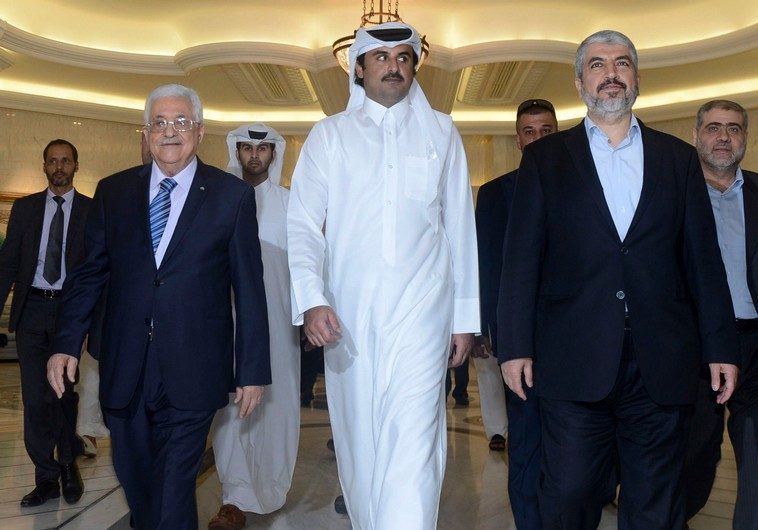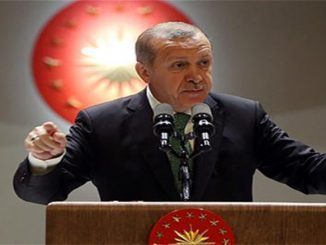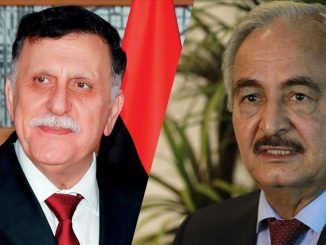
Reconciliation talks between Hamas and Fatah has failed as announced on June 18. The talks started in Doha in June 2014, and they were aimed to bring in to action the terms of the Beach Refugee Camp agreement signed between the two movements on April 23, 2014.
The talks in Doha on February 7-8 were the third round which brought together the Palestinian rivals under Qatar’s mediation.
According to the agreement, a Palestinian consensus government is to be formed to prepare for the Palestinian presidential and legislative elections within six months, activating the role of the Palestinian Liberation Organization, and ending the detention policy in the West Bank and the Gaza Strip.
Moreover, the agreement stated that Mahmoud Abbas must call for summoning the Palestinian Legislative Council, inactivated as a result of the Hamas takeover of the Gaza Strip in 2007.
Since the agreement, Hamas and Fatah have disputed over several issues.
Hamas did not want to hand over the management of Gaza Strip border crossing and the consensus government did not distribute the salaries of Hamas-hired civil services after Hamas reached power in Gaza in 2007. As a result, neither party executed the rest of the terms.
Amin Maqboul, the secretary-general of Fatah’s Revolutionary Council, slammed Hamas, calling it “intransigent.” He said, “The last meeting in Doha failed because Hamas does not want to implement what has been agreed upon in all previous understandings.”
Maqboul added, “Hamas wants to resolve the issue of the civil servants it had hired after taking control of Gaza in 2007 by placing them on the Palestinian Authority’s civil servants payroll.
At the same time, Hamas seeks to remain in power in Gaza and to keep managing the border crossings. It refused to adopt the PLO political program regarding the national unity government, although this had been agreed upon in advance.”
He claimed that Fatah has offered to tackle the civil servants issue if Hamas waives power over the Gaza Strip and hands over the crossings. “Hamas refused our proposal and asked us to take steps that meet its interests before relinquishing power in Gaza and handing over the crossings, including activating the Palestinian Legislative Council and settling the Hamas-hired civil servants issue, ” he said.
A senior Hamas leader on condition of anonymity said, “The meetings in Doha failed as a result of the withdrawal of the Fatah delegation from the reconciliation sessions and Fatah’s unwillingness to continue the talks.”
He added, “We felt that Fatah has withdrawn from its decision to solve pending problems — in particular the problem of Hamas-hired civil servants and the reactivation of the Palestinian Legislative Council. Hamas refused to accept the agreement that was signed between the Palestinian factions in Cairo in 2011.”
Regarding Fatah accusation to Hamas as the latter refused to adopt the PLO political program of forming a national unity government, Hamas senior official said, “This political program recognizes the Quartet’s conditions, imposing on Palestine to recognize the State of Israel, which Hamas categorically refuses.”
In 2002, the International Quartet Committee was established in Madrid and played a mediating role in the peace process in the Middle East. The Quartet main aim is to establish a Palestinian state living side by side with Israel. The Quartet is composed of the United States, the European Union, Russia and the United Nations.
The Quartet agreement stated that Israel shall respect the establishment of a Palestinian state with provisional borders and freeze settlement activities in the occupied territories, and the Palestinian counterpart must end the resistance movement and prevent terrorism in cooperation with Israel. However, the Quartet committee’s plan hasn’t been implemented until now.
In addition, Hamas accused Fatah of “trying to exclude Hamas from the political scene and implement the US-Israeli agenda that aims to push Hamas to recognize Israel.”
A high rank meeting between Palestinian top officials was supposed to be held if the talks have succeeded, “If the talks between Hamas and Fatah had succeeded, a meeting was supposed to be held between Mahmoud Abbas — who arrived in Doha on June 16 — and Khaled Meshaal — the head of Hamas’ political bureau — who lives in Doha. But after the failure of these talks, Abbas refused to meet with Meshaal,” Hamas Senior official said.
Some observers believe that the talks will not be fruitful as there are many obstacles.
In this context, Talal Okal, the Political analyst, said that he did not expect the reconciliation efforts in Doha to succeed. He said, “There is no national will to end the division. Hamas and Fatah are not putting the national interests first and are focusing on partisan narrow interests, which hinders the reconciliation.”
He also added that the external pressures played a major role in preventing the completion of reconciliation, and said, “Reconciliation may be achieved if external pressures are lifted, such as the Israeli pressure on President Abbas not to reconcile with Hamas since it does not recognize Israel’s right to exist.”
He said that Egypt’s role in the mediation is crucial, “Egypt is the most capable of settling the reconciliation issue, not only because of its geographical connection with the Palestinian territories, but also because it is the sponsor accepted by both Hamas and Fatah — which is not the case for Qatar that does not have strong ties with Fatah.”
On the other hand, the senior Hamas leader said that Egypt contributed significantly to the failure of Qatar’s efforts to end the Palestinian division, by pushing Fatah not to pass or approve any agreement under Qatar’s auspices.
According to the Egyptian newspaper Al-Youm Al-Sabeh, had reported that Azzam al-Ahmad, the head of the Fatah delegation on reconciliation talks, visited Cairo secretly and met with Egyptian officials to discuss the reconciliation on June 12, before heading to Doha to meet with the Hamas delegation at the recent talks.
Maqboul has mentioned that Egypt and Qatar are working on the Palestinian reconciliation issue without any coordination and by exerting separate efforts that do not include any joint arrangements. He said, “Egypt is the main sponsor of the Palestinian reconciliation and is capable of dealing with this issue since it had sponsored the Cairo Agreement in 2009.”
Another reason behind the failure of the talks between the Palestinian rivals was the lack of flexibility and compromise , the political analyst Hassan said, “The Palestinian reconciliation efforts in Doha were bound to fail. I saw no reason why these talks should have succeeded. No new factors and variables emerged; and this is why the reconciliation failed.”
“Everyone was expecting the failure of these talks. Egypt’s opinion may not be neglected. Cairo believes that the Qatari role in the reconciliation issue is contrary to the Egyptian efforts. There is no coordination of reconciliation efforts whatsoever between Egypt and Qatar. Before heading to Doha, Fatah and Hamas did not demonstrate any flexibility toward their previous positions on their outstanding issues,” he said.
Accordingly, the Palestinian reconciliation will not be an easy task due to the inflexibility in the Palestinians’ policies regarding several issues as well as the compatibility of the positions of Fatah and Hamas’ s regional allies, mainly Egypt and Qatar, which seemed to be hard after the deteriorating relations between these two countries.
The relations between both countries has deteriorated after the military coup in 2013 that ousted Mohammed Morsi-the first democratically elected President. Egypt has accused Qatar and Al-Jazeerah Channel of targeting Egypt’s security.
In addition, Qatar’s name was mentioned by Cairo Criminal Court in the latest verdict issued againstPresident Mohammed Morsi. Moreover, the Egyptian court confirmed the death sentence of six defendants, two of them are journalists at Al-Jazeerah for allegedly passing state secrets to Qatar.



